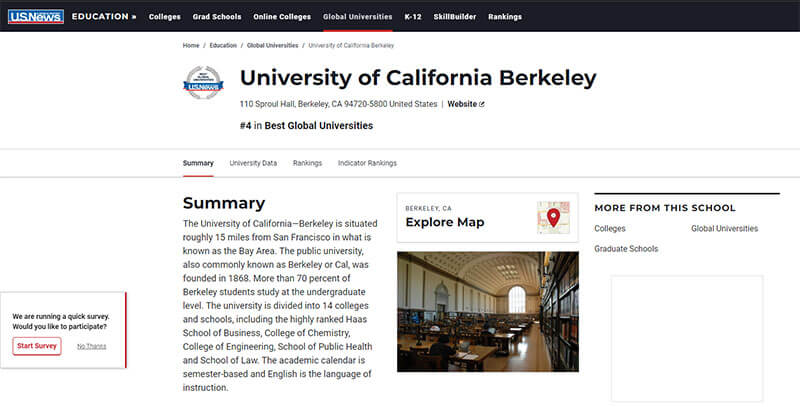
Best Physics Universities in the World Ranking
World's Best Physics Universities
Searching for the best colleges for physics or top physics universities?
We will help you with some recommendations of the best universities for physics in the world in this article.
The present world would be substantially different if physicists did not work on their magical advancements. The study of physics was a key contributor to the development of quantum theory, the theory of relativity, the big bang, and atom splitting. It also forms the basis for many important discoveries of the modern world.
Well! Physics students must have a highly sharp mathematical mind, a solid understanding of scientific theory, and a great interest in new physical findings. These knacks would help them to fare well in their physics studies.
Contact us for top physics universities email list

How to find top universities for physics?
Find the top physics universities in the world by following these handy tips:
- You can use search engines to know about the various institutions that are highly efficient for physics studies. Type "universities for physics" or "best universities physics," and you will get many good recommendations popping up.
- You can go through the details available on the websites, download the brochures and get all the necessary information from there.
- There are many official websites like https://www.topuniversities.com/, https://www.usnews.com/, and more to know about the university rankings as per subject, location, and other data fields you need.
- You can ask for recommendations from friends and family who might have completed their studies at those global universities.
- Talking with career counselors will also help you find the best global universities for further study in physics.
- Consulting your teachers can be another way to choose good universities for physics.
- Check the university's global ratings and reviews before enrolling to know about their education system.
Here is the list of the best physics universities!
1. Massachusetts Institute of Technology
Location: Cambridge, Massachusetts, U.S.
Best Global Universities Overall Rank: 2
Website: https://www.mit.edu
The MIT Department of Physics is regarded as a pioneer in physics research on a global scale. Between 260 and 290 students are graduates of the MIT Department of Physics, with 45 students beginning and graduating every year. Almost 90% of the students are pursuing a Ph.D. in physics, often taking 5 to 7 years to complete their studies. The Flexible and Focus programs in the Physics Department lead to a Bachelor of Science in Physics.
Most physics majors choose the Flexible track because it offers demanding courses in fundamental physics themes. Because of its flexibility, many students can complete second majors in other fields. Students who select the Focus track complete more specialized mandatory coursework, including two terms of experimental physics, and also produce a research thesis. For more updates, you can visit their official website.
2. Stanford University
Location: Stanford, California, U.S.
Best Global Universities Overall Rank: 3
Website: https://www.stanford.edu

Source: Stanford University
The Physics Department at Stanford University is a teaching and research unit of the School of Humanities and Sciences. They provide physics majors and minors, astronomy minors, and other concentrations for undergraduate students. They offer a Ph.D. destination program for graduate students. They also teach a wide range of courses for undergraduate and graduate students with a major in physics and significant lecture and lab courses for the General Education Requirements in Natural Sciences, which offer chances for graduate teaching assistants. Research in astrophysics, cosmology, particle physics, atomic and laser physics, and condensed matter physics is mentored by graduate students, postdoctoral fellows, and undergraduate and graduate students. They have strong ties to the Applied Physics and SLAC departments. The Physics Department is home to the Stanford Institute for Theoretical Physics (SITP).
Database of School, College, & Universities
3. Harvard University
Location: Cambridge, Massachusetts, U.S.
Best Global Universities Overall Rank: 1
Website: https://www.harvard.edu

Source: Harvard University
The research interests are broad and varied in the Harvard University Department of Physics. The exceptional staff of today, which includes 10 Nobel Prize winners, engages in teaching and research that transcends the field and establishes its boundaries, making Harvard's physics department one of the best in the country. Harvard offers many possibilities for undergraduate concentrators, graduate students, and postdoctoral researchers to participate in top-notch physics, from theoretical to experimental. The department has significant ties to the departments of astronomy, biophysics, chemistry and chemical biology, and molecular and cellular biology since the research conducted in the department regularly crosses academic boundaries. John A. Paulson School of Engineering and Applied Sciences conducts extensive research in computational physics, electrical engineering, and nanotechnology. The Harvard/MIT Center for Ultracold Atoms is possibly the best example of the tight ties between the Harvard Physics Department and MIT.
4. University of California—Berkeley
Location: Berkeley, California, U.S.
Best Global Universities Overall Rank: 4
Website: https://www.berkeley.edu
UC Berkeley is home to teachers committed to scientific research, teaching the next generation of physicists, and engaging undergraduate and graduate students in cutting-edge research. Every year, more than 7000 students from all over the world enroll in Berkeley Physics. In addition, the lively activity of this department is supported by the personnel, post-docs, and guests. Berkeley's physics department continues to revolutionize how we see the universe and inspire technological advancements that will change the world.
5. California Institute of Technology
Location: Pasadena, California, U.S.
Best Global Universities Overall Rank: 9
Website: https://www.caltech.edu
Caltech's physics teachers, researchers, and students are at the vanguard of theoretical and applied physics. They study fundamental laws of nature and apply their insights and discoveries to help us better comprehend the natural phenomena that exist throughout our universe. Academics and research go hand in hand in PMA. The greatest structures of the universe, condensed matter physics, basic particles at the tiniest scales, and numerous opportunities to participate in advanced research projects are all presented to students. There are options for undergraduate and graduate study in the academic physics program. Both academic pathways give students a solid foundation in theoretical and applied physics principles and position them for further academic pursuits or professions in various related sectors. Physics research is extremely interdisciplinary and frequently conducted in conjunction with experts from the departments of engineering, chemistry, biology, planetary science, applied physics, and astrophysics, as well as with associates from other institutions and research facilities. The research areas are Nuclear physics, observational astrophysics, cosmology, gravitational wave astronomy, condensed-matter physics, experimental elementary particle physics, theoretical elementary particle physics, and quantum optics and information.
6. University of Chicago
Location: Chicago, Illinois, U.S.
Best Global Universities Overall Rank: 15
Website: https://www.uchicago.edu

Source: University of Chicago
The University of Chicago takes pride in its multidisciplinary research. The Enrico Fermi Institute, the James Franck Institute, the Institute for Biophysical Dynamics, the Kavli Institute for Cosmological Physics, the Kadanoff Center for Theoretical Physics, and more are just a few of the multidisciplinary institutions and centers where physics research is conducted. For the purpose of enhancing the student's capacity to achieve their academic objectives, the Department of Physics offers several awards. You can look at their official website to learn more about the department.
7. University of Tokyo
Location: Tokyo, Japan
Best Global Universities Overall Rank: 77
Website: https://www.u-tokyo.ac.jp/en

Source: University of Tokyo
The University of Tokyo's Physics Department is considered to be the best. They focus study in Condensed matter physics, astrophysics and cosmology, elementary particle physics, nuclear physics, atomic and molecular physics, quantum information, biophysics, and plasma physics. The Department includes more than 130 faculty members, many of whom are internationally renowned and involved in advanced research while also dedicated to assisting their students. The core departmental faculty are based at the Hongo campus. They can perform varied research owing to this. Moreover, the institutions provide teachers and students access to large-scale resources, including deep space telescopes, particle accelerators, and equipment that simulates harsh environmental conditions.
8. Princeton University
Location: Princeton, New Jersey, U.S.
Best Global Universities Overall Rank: 16
Website: https://www.princeton.edu

Source: Princeton University
The Princeton University Physics Department was originally a part of the Engineering School but separated into a separate department in 1929. Princeton University has been associated with 16 Nobel Laureates in Physics. The main research areas are Atomic Physics, Biological Physics, Condensed Matter Experiments, Cosmology & Gravity Theory, Particle & Nuclear Astrophysics, Mathematical Physics, and more. You can check their official website for more updates.
9. Tsinghua University
Location: Beijing, China
Best Global Universities Overall Rank: 26
Website: https://www.tsinghua.edu.cn/en/

Source: Tsinghua University
Tsinghua University's Physics Department was founded in 1926. Under Professor Chi-sun Yeh's direction, the Department has established a reputation as one of China's top physics departments. Nine members of CAS are currently employed at the department, with 93 faculty members overall. The National Award in Natural Sciences, National Science and Technology Progress Award, National Technological Invention Award, Qiu Shi Outstanding Scientist Award, Qiu Shi Outstanding Scientific Research Team Award, and other awards have been given to numerous faculty members for their research accomplishments. To explore more, you can visit their official website.
10. Université Paris-Saclay
Location: Saint-Aubin, France
Best Global Universities Overall Rank: 60
Website: https://www.universite-paris-saclay.fr/en

Source: Université Paris-Saclay
The Master of Physics program of Université Paris-Saclay is to give students a highly advanced experimental and theoretical scientific education, drawing on the wide range of physics research areas and concerning current research and development concerns. The variety of instructional strategies, conceptual or application-oriented, allowing for immersion in a lab or a business and aiming for professional integration after 5 or 8 years of higher education, is tailored to different student profiles. It provides a wide range of employment prospects. All national and international students who speak French or English are eligible to apply for the Master of Physics program. It offers several introductory general physics courses in the first year (M1 Fundamental Physics, M1 Physics and Applications, or M1 General Physics in English), allowing students to select their M2 specialization after the M1 year. A program called M1 MONABIPHOT also focuses on theoretical and experimental aspects of photonics at the intersection with other disciplines.
11. University of Cambridge
Location: Cambridge, England, United Kingdom
Best Global Universities Overall Rank: 8
Website: https://www.cam.ac.uk/

Source: University of Cambridge
The Department of Physics in Cambridge provides three- and four-year physics courses, which comprise the two primary paths to a first degree with a physics specialization. The four-year program is intended for students who want to work in physics professionally, such as in academic or industrial research. The three-year program is intended for students interested in physics but may not plan to pursue careers as professional physicists. Graduates of either program have access to a highly diverse range of job choices. The Bachelor of Arts, or B.A., with honors, is awarded upon completion of the three-year program; the Master of Natural Sciences, or M.Sci., is awarded upon completion of the four-year program.
Know more about a career in physics
So, did you ever thought about what you can do with a physics degree?
For potential students, one intriguing component of physics careers is the variation. The physics graduates are in high demand across a range of industries. In addition to a broader comprehension of how the world functions on a scientific and human level, they include abilities related to numeracy, problem-solving, data analysis, and the conveyance of complicated concepts. Physics grads also make more money because of their highly marketable and valuable skill set. While the average graduate starting wage in the U.K. is UK £23,000 (about US$29,592), individuals with a BSc in Physics make about 14.4% more.
You can do wonders for your professional path through a physics degree if you desire to investigate space, time, matter, or any of the many other fascinating aspects of the physical world. While many physics graduates pursue careers in research, they are heavily demanded in various sectors, including education, the automobile and aerospace industries, defense, the public sector, healthcare, energy, materials, technology, computers, and IT.
Those seeking long-term research careers should consider additional study, as senior research roles are frequently reserved for students with at least a master's degree. However, it is still possible to enter scientific research as a trainee with a good undergraduate degree. Leading researchers can also earn the designation of CPhys from the Institute of Physics along with the MSc, MPhys, and Ph.D. qualifications.
The major goal of graduate-level physics education is to provide more in-depth, specialized information to enable you to operate successfully in a certain profession. Astrophysics, particle physics, biotechnology, nanotechnology, meteorology, aerospace dynamics, atomic and laser physics, atmospheric, oceanic, and planetary physics, and climate science are some potential fields of specialty.
⟶ Careers in space and astronomy
Everyone aspires to be an astronaut when they are young, but if you study physics, you could have a chance. An undergraduate degree may be sufficient for administrative and trainee positions in this industry. Still, you'll need at least a master's degree for higher-level and more specialized positions.
⟶ Careers in healthcare
There are several physics professions in the healthcare field, even though it might not be the first one that comes to mind. Biomedical engineering and medical physics have much in common, and physicists collaborate with biomedical engineers to develop, evaluate, and maintain medical technology and apparatus. While advanced medical degrees are required for specialties like cardiology and neurology, physicists are frequently hired in fields like radiology, radiation oncology, and nuclear medicine to test and certify the most up-to-date tools and technology.
Education Marketing Resources
- 2023 Best Global Universities: Top 50
- The Metaverse In Education - Lessons Get Converted Into Virtual Reality
- Why Online Learning is the Future of Education in 2023
- Best universities in the UK 2023 - University Rankings
- The Top Five Critical Issues Facing Educators in 2023
- 10 Marketing Strategies to Attract More Students in 2023
- 2023 Best Public Elementary Schools in America
- 2023 Best Boarding High Schools in America
⟶ Careers in Engineering
Many professions in physics are available in the engineering field, especially in manufacturing and technology-based positions. Physics graduates benefit from various employers in various industries, including health, energy, transport, defense, space exploration, and telecommunications. They are frequently tasked with designing and enhancing goods and manufacturing processes.
⟶ Careers in technology
The technology sector, a vast area of ongoing growth and innovation, is a never-ending source of new opportunities, challenges, and career options. Graduates in physics have the opportunity to collaborate with other experts to create new concepts and goods. New fields like robotics, nanoscience, and nanotechnology are in high demand for research and development personnel from various backgrounds.
Research facilities in the public or commercial sectors may provide the setting for technology professions in physics. Large technology firms like Philips or Siemens, eager to entice creative and brilliant researchers worldwide, provide many chances for graduates.
⟶ Careers in geophysics and meteorology
Physics majors are excellent prospects for environmental employment because they scientifically understand how the Earth works. Geophysicists are more interested in predicting natural disasters, whereas meteorologists concentrate on daily weather forecasts and the long-term consequences of climate change studies.
Is something like this- what can I do with a physics degree strike your mind? You may enter the finance industry using your mathematics skills or the legal industry using your technical innovation knowledge (such as patent law or forensics). Two further prospective sectors where physicists are in demand are media and entertainment. These sectors include scientific journalism, game programming, and special film effects. However, the further alternatives are education, industry, transportation, architecture, and communications jobs. So brighten up your future by studying physics at reputed institutions.
Education Marketing Resources
Verified Email Lists of K–12 Schools, Colleges, and Universities
Target schools, colleges, universities, and educational institutions with accurate, up-to-date contacts. Enhance your campaigns with verified emails of administrators, educators, and key decision-makers across the education sector.
Get Customized Education Contacts



